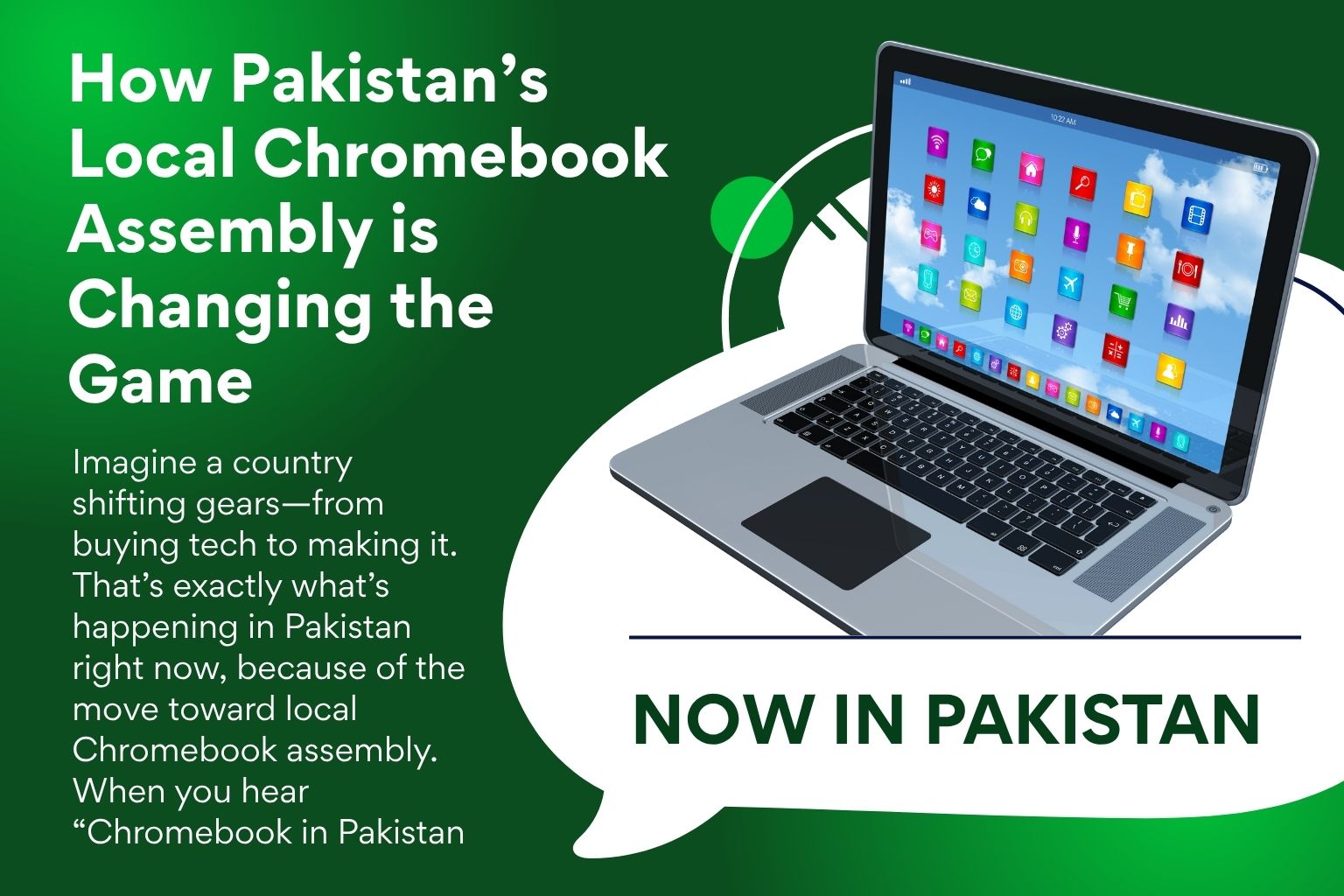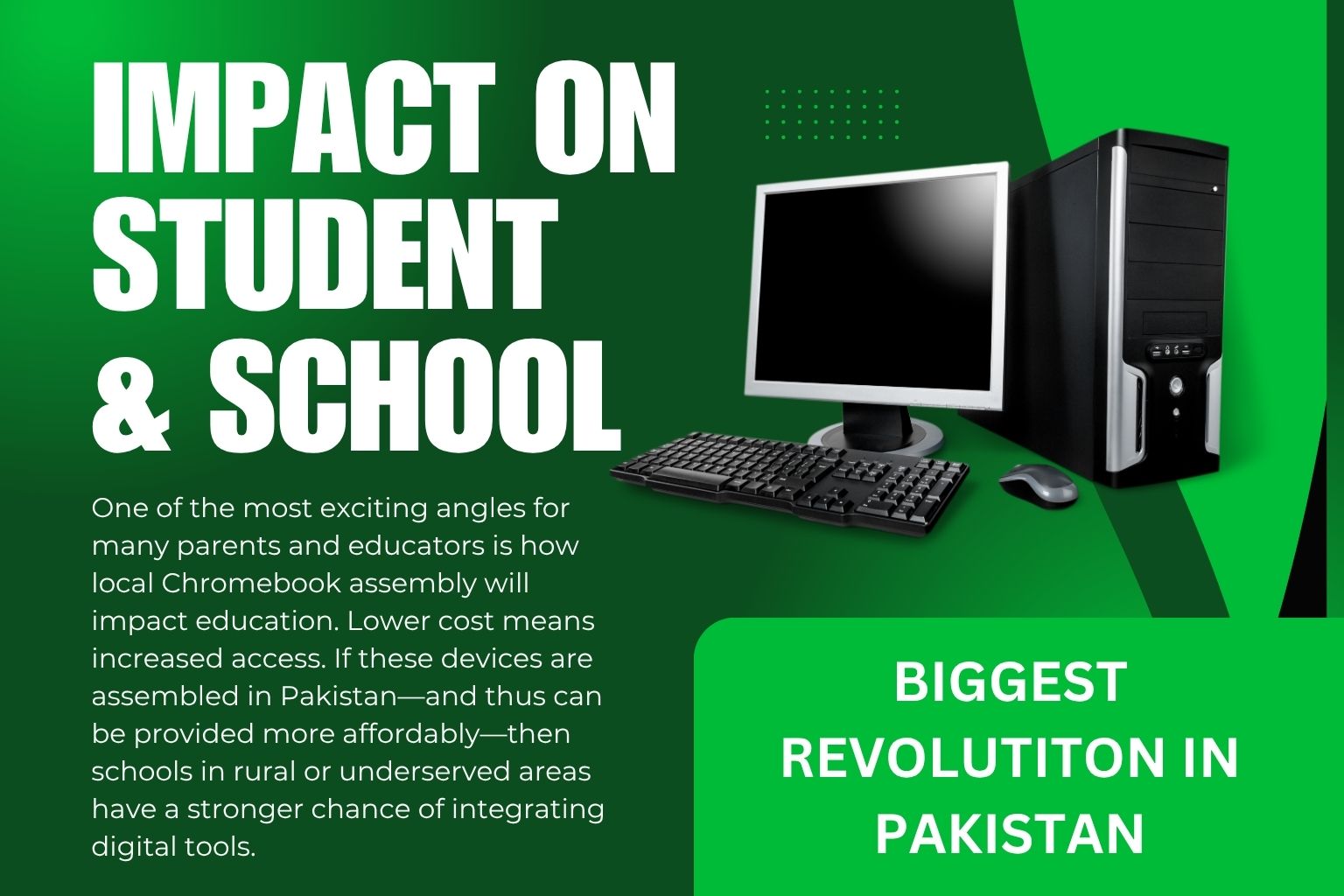How Pakistan’s Local Chromebook Assembly is Changing the Game
Smash Code
Nov 06, 2025

From Consumer to Creator—What It Means When Pakistan Starts Chromebook Assembly
Imagine a country shifting gears—from buying tech to making it. That’s exactly what’s happening in Pakistan right now, because of the move toward local Chromebook assembly. When you hear “Chromebook in Pakistan” these days, it means more than just laptops arriving in boxes—it means laptops being put together here, by local hands, for local people.
Recently, Google announced that local Chromebook assembly is underway in Pakistan, a development hailed by government officials as a major milestone. (The Express Tribune) So what exactly is changing? And why should everyday folks care?
First off, localising the manufacturing of Chromebooks means shorter supply chains, lower costs, and a stronger link between “made in Pakistan” and digital devices. Secondly, this opens up new job opportunities in the tech-hardware sector—a field that historically has been more about imports than local production. In other words, when we talk about “Chromebook in Pakistan,” the story is now being written from right here.
The Big Announcement: Chromebook assembly in Pakistan

In Islamabad, during a formal launch event, the Deputy Prime Minister and Foreign Minister, Ishaq Dar, described the initiative of local Chromebook assembly as “an industrial milestone.” (Dawn) He pointed out that this isn’t just about putting devices together—it’s about future exports, new jobs, and a stronger digital economy in Pakistan.
At that event, the partnership between Google and Pakistan was revealed to include a strategic MoU that covers skills training for 100,000 developers, the rollout of AI-powered solutions, and the localisation of Android services for public safety. (The Express Tribune) This fills out the picture of “Chromebook in Pakistan” as more than hardware—it’s a platform.
In short, the government and Google are saying: we’ll build the devices here, we’ll train the talent here, and we’ll build a tech ecosystem here. That is what “Chromebook assembly” now signals in Pakistan.
Why Local Assembly Matters
Why does local Chromebook assembly matter? Several reasons. First, it helps reduce costs. When devices are assembled locally, you avoid some of the import duties, shipping expenses, and delays that come with importing finished products. That means a “Chromebook in Pakistan” can reach more people at more accessible prices.
Secondly, the local assembly strengthens the hardware supply chain in Pakistan. As the government put it, the move is about jobs, manufacturing, and innovation. (The Express Tribune) When you have assembly lines, parts sourcing, logistics, packaging and testing in Pakistan, you build expertise—and that expertise can spin off into other tech-hardware ventures.
Thirdly, there’s the educational impact. The government believes that local production of affordable digital tools will bridge access gaps, especially in education. When a “Chromebook in Pakistan” is made in Pakistan, schools, students, and underserved communities have a better chance of getting tech access.
Chromebook Assembly: The Role of Education & Skills

Part of the announcement focused on training: the deal with Google includes upskilling 100,000 developers and offering 100,000 career certificates. (Dawn) This is a key piece of the “Chromebook in Pakistan” story: not only are devices being assembled locally, but people are being trained to build, program, and support the systems behind them.
By linking local Chromebook assembly with training, Congress ensures that hardware production doesn’t stand alone—it becomes part of a larger educational and innovation push. Students and young professionals will gain skills that apply not just to Chromebooks, but to AI-driven solutions, Android services, and startup development. Therefore, when you hear “Chromebook assembly in Pakistan,” think hardware + human-capital.
What It Means for Pakistan’s Tech Ecosystem
With local Chromebook assembly underway, Pakistan’s tech ecosystem stands to gain. First, the domestic hardware manufacturing footprint grows. Second, local startups and developers get closer access to Google’s global platform and support. As Ishaq Dar put it: “Google’s decision to establish a local office, along with the assembly line, would bring the tech giant closer to Pakistan’s developers, startups, and entrepreneurs.” (The Express Tribune)
Moreover, this development positions Pakistan as a potential regional tech-hardware hub. Local Chromebook assembly sends a signal to investors: Pakistan isn’t just a market to sell to—it’s a place to build from. When “Chromebook assembly in Pakistan” gains traction, hardware investors, component suppliers, and tech manufacturing firms may start seeing Pakistan as part of their map.
And let’s not forget the export angle. While the immediate market is domestic, the government is already talking about future exports. A “Chromebook in Pakistan” could eventually become a “Chromebook made in Pakistan” exported to regional markets.
Impact on Schools, Students & Learning

One of the most exciting angles for many parents and educators is how local Chromebook assembly will impact education. Lower cost means increased access. If these devices are assembled in Pakistan—and thus can be provided more affordably—then schools in rural or underserved areas have a stronger chance of integrating digital tools.
When students in Pakistan get access to a “Chromebook in Pakistan” that is affordable, reliable and supported locally, the digital divide begins to shrink. Moreover, local support, service networks, and training mean the devices are more likely to be kept running, repaired, and upgraded. It’s not just about handing out laptops—it’s about sustaining learning ecosystems.
Furthermore, by tying the assembly initiative to developer training and AI-solutions, the narrative becomes: students will not only consume technology—they might help create it. That’s a powerful shift in mindset when it comes to “Chromebook assembly in Pakistan.”
Manufacturing, Jobs & Economic Boost
Hardware manufacturing creates jobs. Local Chromebook assembly means assembly line workers, quality testers, logistics staff, packaging teams, and service support roles. When the government says “new jobs,” this is what they mean. That’s the local labour impact of “Chromebook assembly in Pakistan.”
Beyond direct jobs, the supply chain ripple effect matters: suppliers of components, logistics providers, customs facilitation, even skills training centres—these all get a boost. According to reports, the facility at Haripur is expected to support up to 500,000 Chromebooks annually by 2026. (ProPakistani) That means volume, scale, and a real manufacturing enterprise.
And from an economic point of view, the narrative is compelling: Pakistan is moving from technology consumer to producer. That transition is exactly what the “Chromebook in Pakistan” story is signalling—moving up the value chain, capturing more of the tech-hardware value, not just importing finished goods.
Challenges and Future Outlook
Of course, local Chromebook assembly in Pakistan is not without challenges. Supply chain robustness, component sourcing, quality control, power and logistics infrastructure—all of these matter. But the government and Google’s partnership seem to be designed to address many of these hurdles. For example, the skill-training component helps build local capacity.
Looking ahead, the future of “Chromebook assembly in Pakistan” depends on scaling—and on how well the devices are adopted in education, government, and consumer markets. Will local demand be strong enough? Will prices drop enough to make the devices accessible in rural areas? Will service and warranty support keep pace? These questions matter.
Yet, the trajectory is promising. With global tech players like Google stepping in, the message is clear: Pakistan is open for tech-manufacturing business. The “Chromebook in Pakistan” story becomes part of a bigger national tech narrative—and that’s exciting.
What This Means for You (The Everyday User)
So you might ask: what does all this mean for you—as a student, parent, teacher or tech enthusiast? Well, if you live in Pakistan, local Chromebook assembly means: more affordable devices, possibly better local service, and greater access to digital tools for education and beyond. When you think about buying a Chromebook in Pakistan, you can hope for better value and local support.
Secondly, if you’re a young professional or developer, the tie-in with up-skilling means more opportunities. The “Chromebook in Pakistan” initiative isn’t just about hardware—it’s about building a community of tech talent. When local devices are assembled and local services grow, the ecosystem grows—and you could be part of it.
Lastly, for families and schools, the hope is that digital learning becomes more inclusive. When devices are affordable and locally supported, more students can participate. In short: local Chromebook assembly in Pakistan is not just a headline—it’s a doorway to something more.